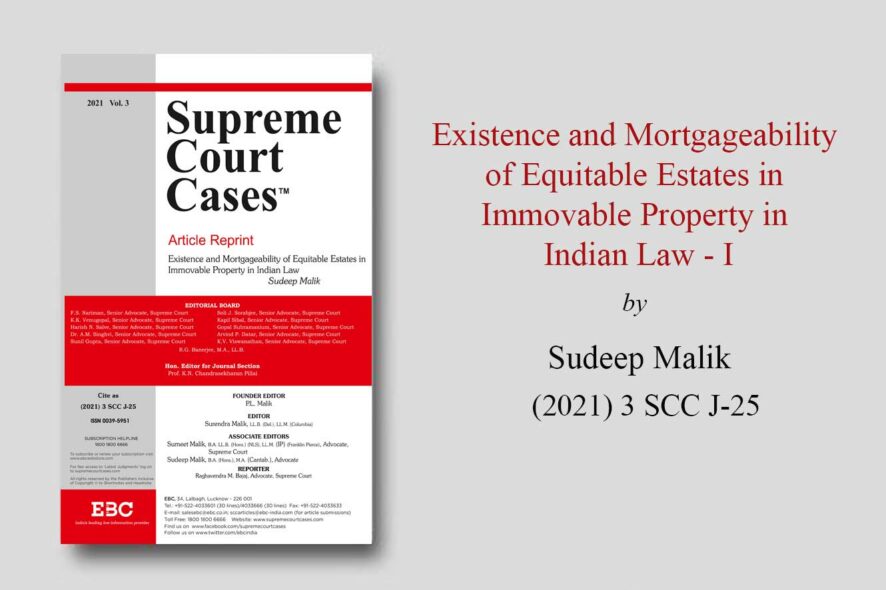The following question of seminal importance was referred to a three-Judge Bench of the Supreme Court in Syndicate Bank v. APIIC, (2021) 3 SCC 736 : (SCC p. 738, para 1)
“Whether a property can be equitably mortgaged by depositing documents which may not be title deeds or registered document of title.”
The Supreme Court did not feel inclined to decide this question since it could decide the case on a narrower issue, and the mortgage of the allotment letter in the facts of that case was enforced on the principle of estoppel.
Had the Supreme Court gone into the above said question it would have found support in Hill Properties Ltd. v. Union Bank of India1, wherein the right of ownership of a flat was purchased by R-5 therein by becoming a shareholder of the housing company which was providing the flat, to the extent of the value of the flat. The share certificate by virtue of which R-5 was allotted the flat was pledged with the Bank to create a mortgage, in the absence of any registered conveyance of the flat in question : facts which are almost identical to the facts of Syndicate Bank case. In Hill Properties case it was held that what the said share certificate, which is the equivalent of an allotment letter, creates a “species of property” or “species of interest” which can validly be mortgaged by deposit of such document with the Bank. The Supreme Court in Hill Properties case followed Himmatlal Shah2, in holding that this “species of property” or “species of interest” in the flat, is freely transferable/alienable i.e. can be sold, gifted, bequeathed, inherited, mortgaged, etc. It was held that this “species of property” includes both an independent right over the flat itself, and an undivided interest over the common areas and facilities (see paras 12, 13, 15 and 16 of Hill Properties).
READ COMPLETE ARTICLE HERE
*The article has been published with kind permission of SCC Online cited as (2021) 3 SCC J-25
† M.A. (Cantab). Associate Editor, Supreme Court Cases. Formerly Visiting Professor of Law at Dr RML National Law University, Lucknow from 2011-2016. The author taught Property Law I and Property Law II full time at RML National Law School for five academic years. The author is grateful to all his students of all the batches at RML National Law School for having provoked the inquiries that have led to this paper and to the forthcoming papers on the issues delineated in this paper. The author is deeply grateful to Prof. Balraj Chauhan, the Creator of many law schools, for his vision and foresight in having given the author full freedom to teach Property Law, to enable students to acquire a working practical understanding of this complex and extremely important area of law.
1(2014) 1 SCC 635 : (2014) 1 SCC (Civ) 513
3 This legal position obtains currently in India and England as well : mortgages can be created in equity.
4 Even though the forms in which a conditional sale mortgage as defined in Section 58(c) TPA and an English mortgage as defined in Section 58(e) TPA are supposed to be created appear to suggest the pre-TPA formula of absolute conveyance of the legal title with right of reconveyance to create these mortgages, the so called absolute conveyance in both sub-sections is only ostensible in nature, and if the stipulated conditions are strictly satisfied, the mortgagor never parts with the absolute title in mortgages created under Section 58(c) or Section 58(e) TPA.








sharing nice information .its good for all.thanks